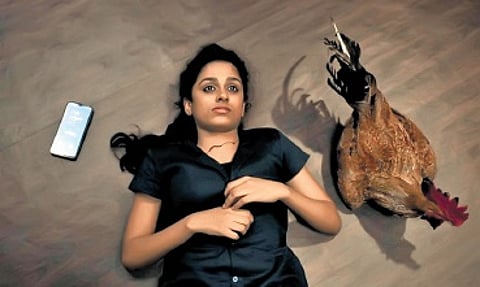'Victoria' movie review: Kaleidoscopic reflections of beauty, banter and womanhood
The unassuming opening of Victoria puts us directly inside a bus that chugs along a routine route, carrying the titular Victoria (Meenakshi Jayan) and an old woman clutching a rooster, of all things. This chicken, destined for sacrificial purposes, passes into Victoria’s hands until the old lady can collect it again in the evening.
From there, the camera embarks on a compelling journey capturing Victoria’s every step as she strides along a sunlit road and enters the microcosm of a women-only beauty parlour. It’s an introduction that whispers, “Settle in, you’re in for something special.”
Selected for the Malayalam Cinema Today section at the 29th International Film Festival of Kerala (IFFK), Sivaranjini J’s directorial debut has garnered significant attention, winning the FIPRESCI Award for Best Malayalam Film by a Debut Director. From the moment Victoria steps into the parlour, the world outside fades away.
Except for the opening and closing shots, the entire film unfolds within the confines of this beauty parlour—a space that is both a sanctuary and a stage. The parlour becomes the crux of the film, a bustling haven where everyday conversations bloom into poignant narratives. Within the boundaries of this parlour, Sivaranjini crafts a warm kaleidoscope of sisterhood, class divides and subtle resistance.
In this all-women domain, one male entity crows out its presence: the rooster. Is it just a cameo, or a feathered cipher for patriarchy? Roosters have it easy in the animal kingdom, don’t they? They mate at will and nobody demands eggs from them. Perhaps the bird represents the male gaze—a quiet intruder in a space designed for feminine respite.
One striking image encapsulates this: Victoria sprawled on the parlour floor beside the rooster, a phone ringing plaintively nearby. The dim lighting casts her in muted solitude. Her expression flits between weariness and contemplation, the unanswered call beside her mirroring her own unspoken struggles. The rooster, oblivious to her turmoil, stands as a stoic observer with its legs tied. It’s a masterstroke of visual storytelling, encapsulating isolation, missed connections, and an uneasy coexistence with societal expectations.
As a first-time cinematographer, Anand Ravi shines brilliantly, leaving a lasting impression. The fluidity of the camera, gliding effortlessly through the cramped parlour spaces, transforms what could have been static into something alive and kinetic. The lengthy single shots are a marvel of blocking, allowing the viewer to feel like an unseen participant amidst the chatter, bickering and camaraderie.
The mirrors, ever-present in a beauty parlour, become silent witnesses, adding depth and layers to the visual frame. One cannot ignore the audacity of these long takes. With multiple characters and overlapping dialogues, they could have descended into chaos, but instead, they create a hypnotic rhythm. The parlour comes alive in its chatter—a kind of symphony where every note, however trivial, adds to the harmony.
At the heart of this parlour is Meenakshi Jayan’s Victoria, a character rendered with quiet dignity and subtle depth. The actor embodies her titular character with such authenticity that one feels her stress, her silences and her fleeting smiles.
From the start, she commands attention through the small, delicate shifts in her expression, conveying a wealth of unspoken emotion. Her performance thrives in its restraint, allowing Victoria’s inner world to unfold naturally. Meenakshi’s body language also feels notably natural in the way she moves and carries herself as a beauty parlour professional.
Sreeshma Chandran, a state award-winning actor, brings warmth and familiarity as a pregnant woman there to get a pedicure. Jolly Chirayath, as a middle-aged woman experiencing the parlour for the first time, strikes a balance between curiosity and vulnerability. Steeja Mary’s portrayal of a woman sneaking in for a makeover amidst family crises is hilariously relatable, with her actions tinged with a comical mix of guilt and defiance.
The dialogues between these women—whether discussing their procedures or life’s greater battles—are refreshingly natural. There’s no pretence of delivering grandiose monologues; instead, their banter flows organically, capturing the intimacy of shared womanhood.
It’s remarkable how Sivaranjini wields her debut with such assuredness. Clocking in at a lean 84 minutes, Victoria wastes hardly any moments, except perhaps for a brief scene involving school children practising a song inside the parlour, which could be considered an ignorable contrivance in an otherwise tight narrative. Almost every other scene, every exchange, is meticulously crafted to advance the narrative or deepen characterisation. She achieves what many seasoned directors struggle with—a sense of completeness without overindulgence. The beauty parlour, under her gaze, becomes more than a backdrop. It’s a haven, a battlefield and a confessional booth.
Women from different walks of life converge here, their stories braided together in a way that feels both unforced and affecting. And yes, amidst the earnestness, there’s humour. The kind that sneaks up on you and leaves you chuckling unexpectedly. Whether it’s the awkward first-timer navigating her hair procedure or the banter about family drama, these lighter moments are a welcome respite.
In a cinematic landscape often littered with overt declarations of empowerment, Victoria stands apart. It doesn’t shout about feminism; it embodies it. The film is unapologetically about women, their lives, their spaces and their choices.
Men are conspicuous only by their absence, and yet their influence—their expectations, their judgments—lingers like a shadow. This quiet rising, this insistence on carving out a female-centric narrative without resorting to preaching, is what makes Victoria special.
As the film draws to a close, it leaves you with the sense that you’ve been a privileged voyeur into a world that feels both personal and universal, with Sivaranjini announcing herself as a filmmaker with a voice worth listening to.
Film: 'Victoria'
Director: Sivaranjini J
Cast: Meenakshi Jayan, Sreeshma Chandran, Jolly Chirayath, Steeja Mary, Darsana Vikas
Rating : 4/5

